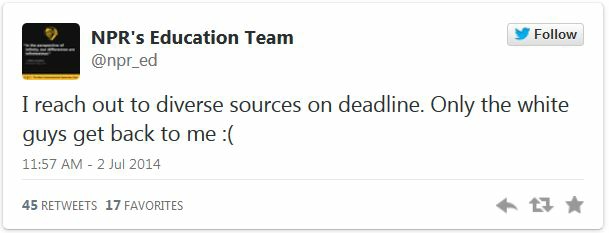NPR Tweets DO Reflect on the Organization
A National Public Radio employee got her hand slapped after tweeting from @npr_ed (NPR's Education Team):
Anya Kamenetz apologized, saying that her tweets don't reflect on the public radio station. But NPR executives don't agree. In response, NPR Standards & Practices supervising editor sent this email to employees:
From: Mark Memmott
Sent: Tuesday, July 08, 2014 2:24 PM
To: News-All Staff
Subject: Reminder: There Is No Privacy On The Web, And ‘Personal' Pages Are Not Safe Zones
"If you wouldn't say it on the air, don't say it on the Web."
That's been the basic guidance for quite a few years.
In reality, Twitter and other social media sites allow us to show more of our personalities than we might on the air or in a blog post.
BUT, though the words may be on "personal" Twitter or Facebook accounts, what we say can reflect on NPR and raise questions about our ability to be objective.
Matt Thompson offers a test. Before posting something about your work or a news event or an issue, even if you're putting it on what you think of as a personal page, ask this question: "Is it helping my journalism, or is it hurting my journalism?"
Here's a bit more from the Ethics Handbook:
"We acknowledge that nothing on the Web is truly private. Even on purely recreational or cultural sites and even if what we're doing is personal and not identified as coming from someone at NPR, we understand that what we say and do could still reflect on NPR. So we do nothing that could undermine our credibility with the public, damage NPR's standing as an impartial source of news, or otherwise jeopardize NPR's reputation. In other words, we don't behave any differently than we would in any public setting or on an NPR broadcast."
Also, despite what many say, retweets should be viewed AS endorsements. Again, from the handbook:
"Tweet and retweet as if what you're saying or passing along is information that you would put on the air or in a ‘traditional' NPR.org news story. If it needs context, attribution, clarification or ‘knocking down,' provide it."
The email provides sound advice for people representing the organization, perhaps even when they're not representing the organization.
Discussion Starters:
- PR Daily asks readers good questions for business communication students: "Do tweets, even from personal accounts, reflect on employers? Do retweets equal endorsements?"
- @NPR is another Twitter handle, but there are no tweets about this incident. Should the account holder have written something? If so, what?
